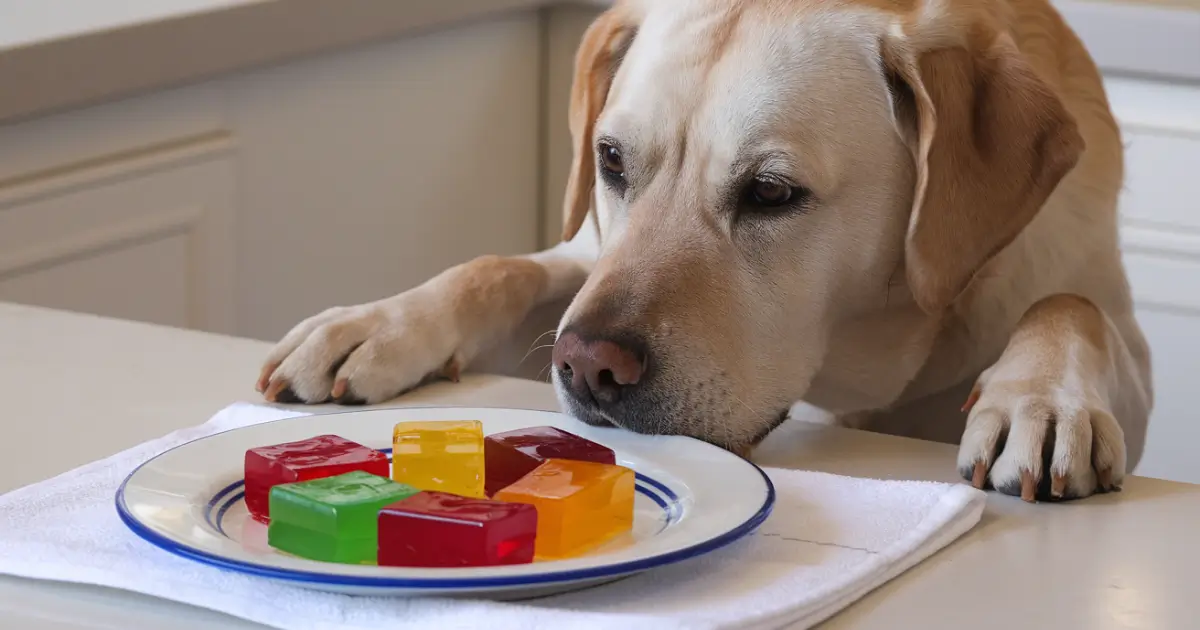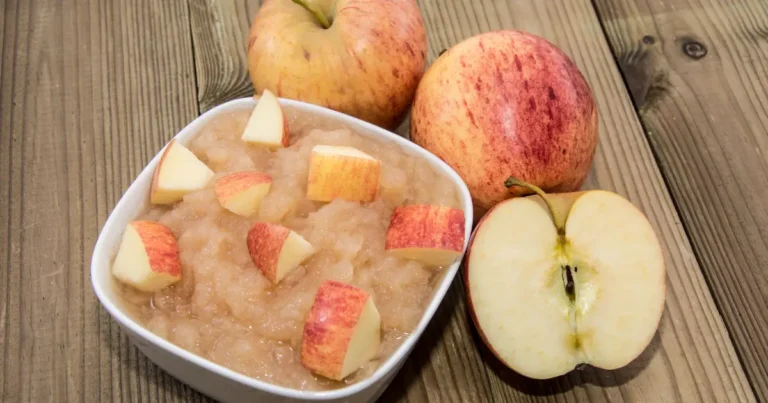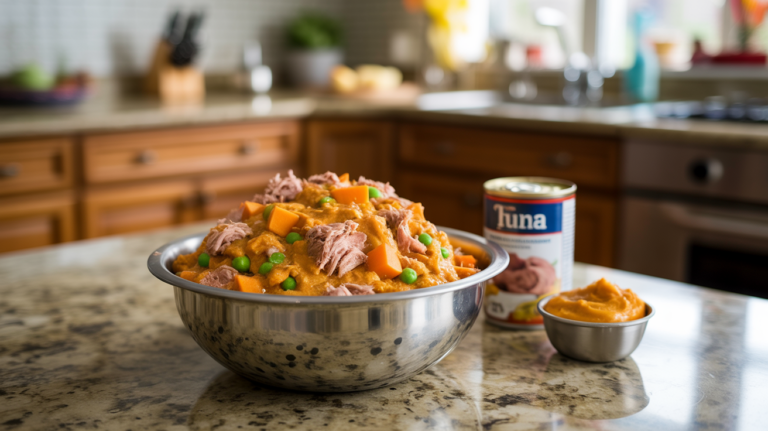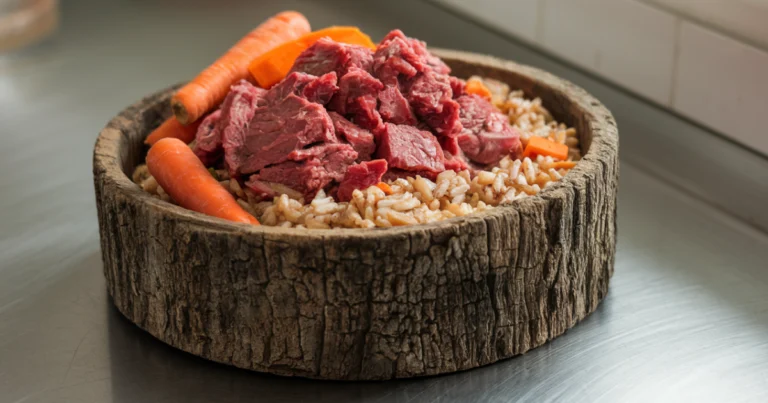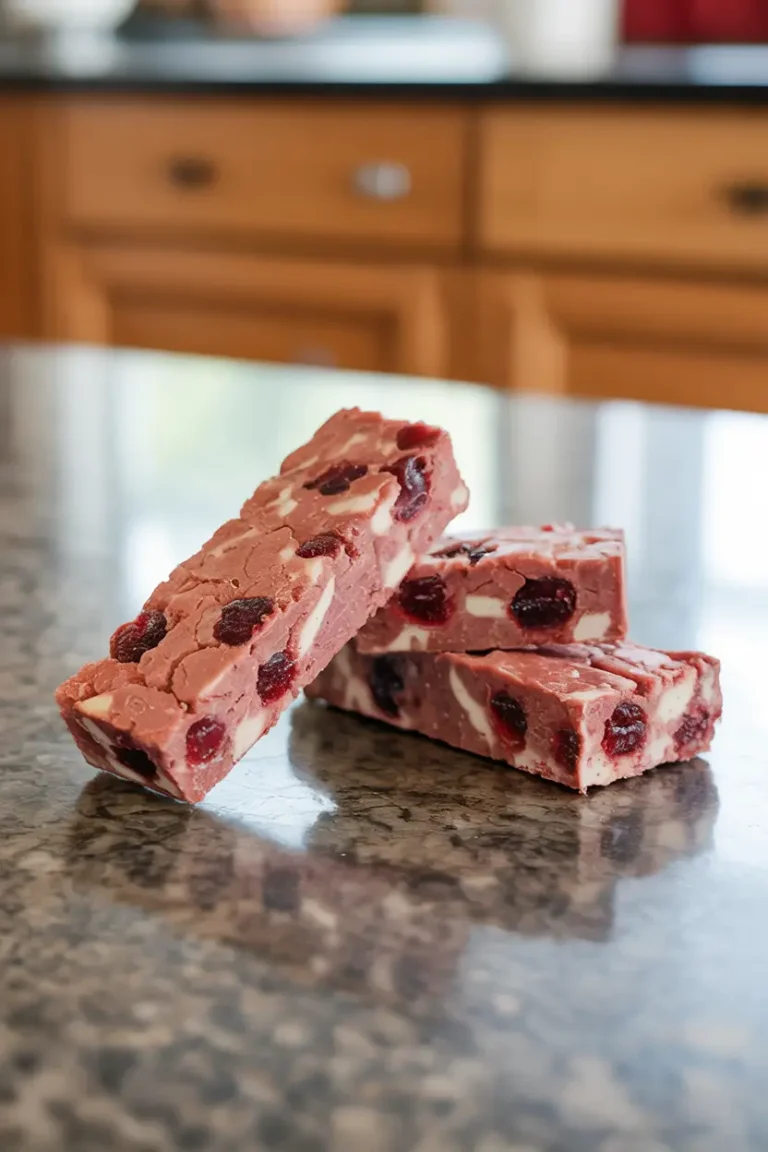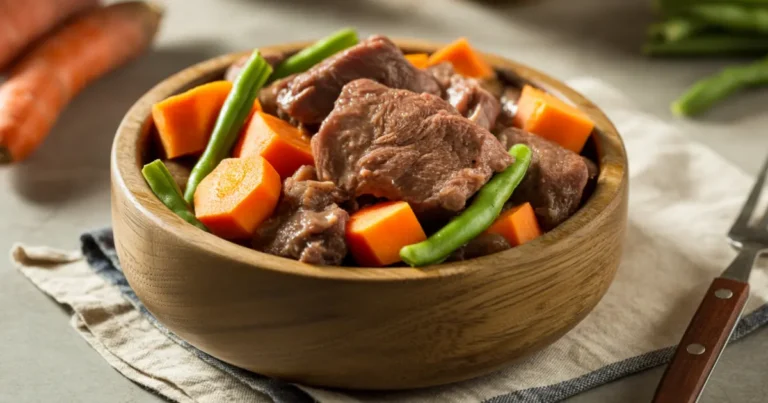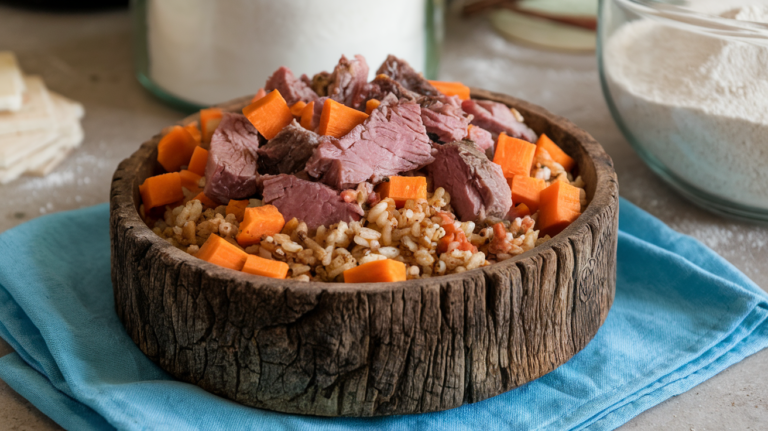Can Dogs Eat Jello? 5 Critical Safety Facts + Hidden Dangers
🔸 SHORT ANSWER: No, dogs shouldn’t consume Jello. Regular Jello has too much sugar and artificial ingredients that are bad for dogs, and sugar-free types might have xylitol, which is very toxic to dogs. While plain, unflavored gelatin is safer, there are better options for dog treats.
When you’re enjoying a colorful, jiggly cup of Jello as a light dessert, you might wonder if your four-legged friend can safely share this treat. “Can dogs eat Jello?” is a common question many pet parents ask, and the answer requires careful consideration of several important factors. These concerns raise important questions about whether is Jello bad for dogs and what precautions pet owners should take.
This comprehensive guide explores whether is Jello good for dogs, and the potential risks it poses, and provides five essential health guidelines every dog owner should understand before sharing this popular gelatin dessert with their canine companion.
Table of Contents
Understanding Jello: Ingredients and Nutritional Profile
Before determining whether can dogs have Jello, it’s important to understand what this familiar dessert actually contains. If you’ve ever asked yourself, “Can dogs have Jello?” when your pet gives you those begging eyes, it’s important first to understand these common ingredients and their implications for canine health.
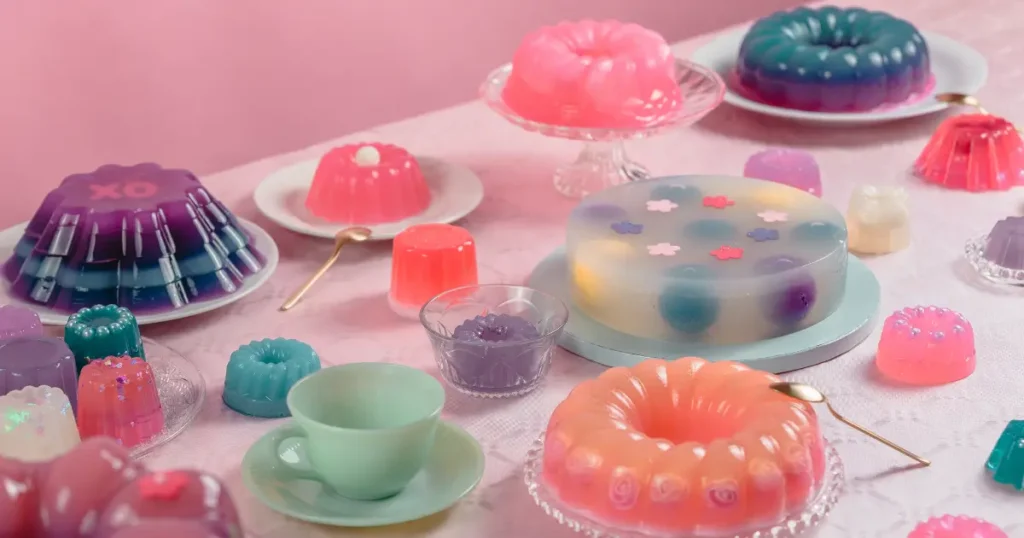
Standard Jello Ingredients
Most commercial Jello products contain:
- Gelatin (usually derived from animal collagen)
- Sugar or artificial sweeteners
- Artificial colors
- Artificial flavors
- Food acids (like adipic acid or fumaric acid)
- Salt
- Preservatives
- Sometimes, additional ingredients like fruit juice
While examining whether can dogs eat gelatin, it’s worth noting that gelatin itself, the protein derived from animal collagen, is generally not toxic to dogs. However, the other ingredients in commercial Jello products raise several concerns for canine consumption.
Types of Jello Products
Different Jello varieties present varying levels of concern when considering is Jello bad for dogs:
- Regular Jello: Contains significant sugar, artificial colors, and flavors
- Sugar-free Jello: May contain xylitol, which is extremely toxic to dogs
- Jello pudding: Contains additional dairy and higher fat content
- Homemade gelatin: May be made with fruit juices, which could include grape (toxic to dogs)
- Jello shots or alcoholic versions: Contain alcohol, which is dangerous for dogs
With this understanding of Jello’s composition, let’s explore five important health guidelines to consider.
5 Important Health Guidelines About Dogs and Jello

Follow these crucial guidelines when determining whether can dogs eat Jello safely:
1. Always Check for Xylitol in Sugar-Free Varieties
This first guideline is absolutely critical for your dog’s safety. When investigating whether Jello is bad for dogs, the presence of xylitol is the most serious concern.
Xylitol is a sugar substitute frequently found in sugar-free products.
- Extremely toxic to dogs, even in small amounts
- Capable of causing rapid insulin release, leading to hypoglycemia (low blood sugar)
- Potentially fatal if not treated immediately
- Known to cause liver failure in some cases
Symptoms of xylitol poisoning can occur within 30-60 minutes and include:
- Vomiting
- Weakness
- Lack of coordination
- Seizures
- Lethargy or collapse
If a product contains xylitol, the answer to “Can dogs have Jello?” is an unequivocal NO. Always carefully read ingredient labels on sugar-free products, as xylitol might be listed under other names like “sugar alcohol” or “birch sugar.”
2. Consider the Artificial Colors and Flavors
When evaluating is Jello good for dogs, artificial additives present several concerns:
- Artificial colors: May cause allergic reactions or behavioral changes in sensitive dogs
- Artificial flavors: Can trigger digestive upset or other adverse reactions
- Food dyes: Some have been associated with hyperactivity or other behavioral issues
These artificial ingredients provide no nutritional benefit and only serve to make the product more appealing to humans. From a canine health perspective, these additives are unnecessary exposure to potentially problematic chemicals.
3. Be Aware of the Sugar Content
Regular Jello contains significant amounts of sugar, which raises concerns when determining can dogs eat Jello safely:
- Obesity and weight gain: Frequent consumption of sugary treats causes unhealthy weight gain.
- Dental Issues: Sugar contributes to tooth decay and gum disease.
- Blood sugar fluctuations: Particularly problematic for dogs with diabetes or insulin sensitivities
- Increased inflammation: Chronic high sugar consumption may contribute to inflammatory conditions
A typical serving of regular Jello (1/2 cup) contains approximately 17-19 grams of sugar—a substantial amount for a dog, especially smaller breeds. This high sugar content alone makes regular Jello a poor choice for dogs, even putting aside other problematic ingredients.
4. Recognize the Minimal Nutritional Value
When considering is Jello good for dogs, examine the nutritional profile:
- Minimal protein: Despite being derived from collagen, processed gelatin offers limited protein benefits
- No fiber: Unlike nutritious treats, Jello provides no digestive benefits
- Few vitamins or minerals: Jello lacks significant nutritional components
- Empty calories: Calories from sugar provide no health benefit
Dogs have limited “treat calories” they can consume without impacting their overall diet and health. Using those calories on nutritionally empty foods means missing opportunities for healthier treat options that could actually benefit your dog’s health.
5. Consider Healthier Gelatin Alternatives

If you’re interested in the potential benefits of gelatin for your dog, consider safer alternatives to commercial Jello when evaluating can dogs eat gelatin:
- Plain, unflavored gelatin: Without added sugar, colors, or flavors
- Bone broth: Contains natural gelatin plus beneficial nutrients
- Commercial dog treats with gelatin: Specifically formulated for dogs’ nutritional needs
- Homemade gelatin treats: Made with dog-safe ingredients and minimal sugar for a healthy snack.
If you’re considering plain gelatin because of potential joint benefits from collagen, consult your veterinarian about better-targeted supplements specifically formulated for canine joint health.
For dogs who enjoy the texture of gelatin treats, consider exploring recipes from dog-specific recipe sites that use pet-safe ingredients rather than reaching for commercially prepared human Jello products.
Potential Health Concerns: Is Jello Bad for Dogs?
Beyond the five guidelines above, there are additional considerations when determining is Jello bad for dogs. Many pet owners may not realize just how many potential health issues can arise when asking can dogs eat gelatin products designed for humans.
Digestive Issues
Even without toxic ingredients, Jello can cause:
- Gastrointestinal upset: Vomiting or diarrhea, particularly in dogs with sensitive stomachs
- Gas or discomfort: From unfamiliar ingredients
- Altered stool consistency: Due to artificial ingredients or sugar
While these issues aren’t typically life-threatening, they can cause discomfort for your pet and cleanup challenges for you as the owner.
Allergic Reactions
Some dogs may experience allergic reactions to ingredients in Jello:
- Skin irritation or itching
- Ear inflammation
- Digestive symptoms
- Respiratory issues in severe cases
Since Jello contains multiple ingredients and additives, identifying the specific allergen can be challenging if a reaction occurs.
Choking or Obstruction Concerns
The jiggly texture of Jello may present physical concerns:
- Potential choking hazard: Especially if a dog tries to swallow large pieces without chewing
- Aspiration risk: Particularly for very excited or fast-eating dogs
While these risks are lower than with some other foods, they remain considerations when evaluating can dogs have Jello safely.
Comparing Jello to Other Human Foods and Treats
To better understand the risks of Jello, it’s helpful to compare it to other human foods dog owners might consider sharing.

Other Sweet Treats
When comparing Jello to other sweet human foods:
- Marshmallows: As explored in our article about can dogs eat marshmallows, these treats contain similar concerns with sugar content but add choking hazards due to their sticky texture.
- Ice cream: It contains sugar plus dairy, which many dogs have difficulty digesting due to lactose intolerance.
- Pudding: Similar sugar concerns as Jello with added dairy content that may cause digestive issues for many dogs.
Savory Human Snacks
Some owners prefer sharing savory treats with their dogs:
- Pretzels: While not sweet, most pretzels contain significant salt, which presents its own health concerns for dogs.
- Pickles: As covered in our article about can dogs eat pickles, pickles contain problematic sodium levels and potentially harmful seasonings.
- Popcorn: Our guide on can dogs eat popcorn explains that while plain, air-popped popcorn might be safer than Jello in some ways, it presents its own concerns, including choking hazards and digestive issues.
- Granola: Though seemingly healthy for humans, most commercial granola contains added sugars, raisins (toxic to dogs), or nuts that can be difficult to digest.
These comparisons illustrate that many human snacks, whether sweet or savory, present concerns for dogs. This reinforces why purpose-made dog treats or simple whole foods typically represent better choices than processed human foods like Jello.
What To Do If Your Dog Eats Jello
If your dog has already consumed Jello, the appropriate response depends on the type consumed and the amount:
If Your Dog Ate Regular Jello:
- Small amount: For most healthy adult dogs, a small amount of regular Jello is unlikely to cause serious problems. Monitor for digestive upset or unusual behavior.
- Large amount: Watch for signs of digestive distress like vomiting or diarrhea. Contact your veterinarian if symptoms develop or persist.
If Your Dog Ate Sugar-Free Jello:
- Any amount: Check the ingredients immediately for xylitol.
- If xylitol is present: This is an emergency situation requiring immediate veterinary care. Call your vet or an emergency animal hospital right away, as prompt treatment is essential.
- If no xylitol: Monitor for digestive upset, but serious complications are less likely.
If Your Dog Shows These Symptoms:
Seek veterinary care immediately if your dog displays:
- Vomiting or diarrhea that persists for more than a few hours
- Lethargy or weakness
- Tremors or seizures
- Collapse or loss of consciousness
- Excessive thirst or urination
- Unusual agitation or behavior changes
Key Takeaways: Can Dogs Eat Jello?
To summarize what we’ve learned about whether can dogs eat Jello:
- Regular Jello contains high sugar content and artificial additives with no nutritional benefits for dogs
- Sugar-free Jello may contain xylitol, which is extremely toxic and potentially fatal to dogs
- Plain gelatin without additives is generally not toxic but offers minimal nutritional value
- Better alternatives exist if you want to give your dog gelatin, such as bone broth or specially formulated canine supplements
- The risks outweigh any potential benefits for most dogs when considering commercial Jello products
Important Veterinary Disclaimer: This information is only for learning purposes and should not be used instead of professional veterinary advice. Before giving your dog new foods or if your pet seems sick, always talk to your vet first. If you think your dog ate something bad, call your vet or an emergency animal hospital right away.
Conclusion: Making Informed Decisions About Jello for Dogs
When evaluating whether is Jello good for dogs, the evidence suggests it’s best avoided or offered only in very specific circumstances. While plain gelatin itself isn’t directly toxic, the additional ingredients in commercial Jello products, particularly in sugar-free varieties, present unnecessary risks with virtually no nutritional benefits. The question of is Jello good for dogs ultimately comes down to weighing minimal potential benefits against multiple health concerns.
Instead of wondering “can dogs have Jello,” focus on providing your dog with treats specifically formulated for their nutritional needs or whole foods that offer actual health benefits. The best way to show love to your pet is through appropriate nutrition, exercise, and attention, not by sharing potentially problematic human foods.
For more comprehensive information about foods that are safe to share with your dog, check out our main guide on what foods can dogs eat from the table, which covers a wide range of human foods and their safety for canine consumption.
References
This article is based on current veterinary research and guidance from leading pet health organizations:
- American Society for the Prevention of Cruelty to Animals. People Foods to Avoid Feeding Your Pets. ASPCA Animal Poison Control Center.
- American Kennel Club. Dangerous Foods for Dogs. AKC Expert Advice on Canine Nutrition.
- Pet Poison Helpline. Xylitol Poisoning in Dogs. Emergency Veterinary Toxicology Resource.
- PetMD Editorial Team. Veterinary-Reviewed Nutrition Guidelines.
FAQs About Dogs and Jello
Can puppies eat Jello?
Puppies should never be given Jello. Their developing digestive systems are more sensitive to dietary changes, they’re at higher risk for adverse reactions, and they need carefully balanced nutrition for proper growth. Additionally, establishing healthy treat habits early in a dog’s life sets the foundation for long-term health.
Is gelatin good for dogs with joint problems?
While gelatin contains collagen, which is related to joint health, commercial Jello isn’t an appropriate source for therapeutic amounts. If you’re concerned about your dog’s joint health, consult your veterinarian about specifically formulated joint supplements containing glucosamine, chondroitin, or medical-grade collagen designed for dogs.
Is it possible for me to prepare homemade gelatin treats for my dog?
Yes, you can make safer gelatin treats at home using unflavored gelatin and dog-safe ingredients. Avoid adding sugar, artificial sweeteners, or toxic foods like grapes. Simple recipes using bone broth as a base can provide a more appropriate gelatin treat than commercial Jello.
What about Jello made with fruit juice?
Fruit juice-based gelatin still contains high sugar content, and some fruits (like grapes and raisins) are toxic to dogs. Additionally, commercial fruit juice often contains added sugars and preservatives. If you want to offer fruit to your dog, small pieces of fresh, dog-safe fruits like blueberries or apple slices (without seeds) are better options than fruit-flavored Jello.
Is Knox gelatin safe for dogs?
Plain, unflavored Knox gelatin (without added sweeteners or flavors) is generally not toxic to dogs in small amounts. However, it still offers minimal nutritional value and shouldn’t replace proper dog treats or food. If you want to offer plain gelatin for potential joint benefits, consult your veterinarian about appropriate dosing for your specific dog’s size and needs.

